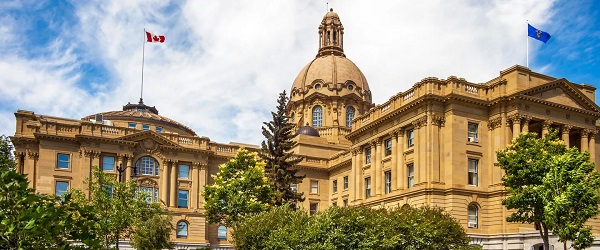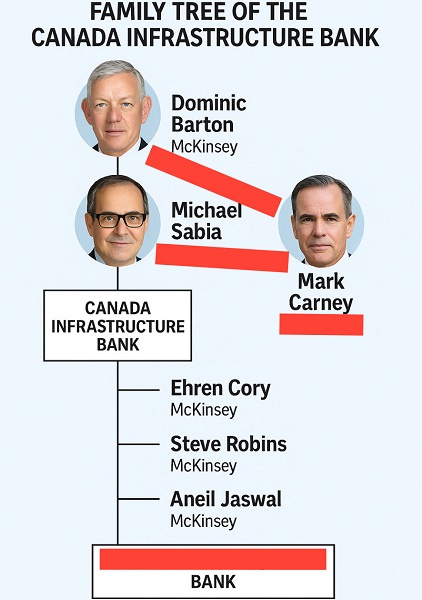2025 Federal Election
Researchers Link China’s Intelligence and Elite Influence Arms to B.C. Government, Liberal Party, and Trudeau-Appointed Senator

 Sam Cooper
Sam Cooper
“The PRC uses its UFWD in Canada and around the world to stifle criticism and manipulate Canadian communities. These activities constitute a threat to Canada’s sovereignty and to the safety of Canadians.”
A powerful new investigative map released by diaspora researchers traces political ties reaching from Chinese Communist Party-controlled intelligence networks to the highest levels of British Columbia’s government. The visual exposé centers on Senator Yuen Pau Woo and his pivotal role in welcoming Chinese state-linked entities into Canadian institutions—an effort that resonates in a secretly recorded 2020 meeting obtained by The Bureau, in which Woo assured United Front figures he would help shield them from critical scrutiny.
These same United Front entities have been credited by Beijing for their role in promoting Chinese Canadian candidates during federal election campaigns.

Woo was appointed to the Senate by Prime Minister Justin Trudeau in 2016, with an official announcement citing his work with the same entities now identified by diaspora researchers as Chinese-influenced trade lobbies.
The map, titled “From Ottawa to Victoria,” is part of the ongoing Dotting the Map series from Canadian Friends of Hong Kong and Found in Translation, two diaspora-led civil society groups. Built from open-source records, the map draws direct lines between United Front-aligned business, political, and media organizations and prominent Canadian leaders, including Senator Woo, former BC Liberal Premier Christy Clark, ex-minister Teresa Wat, Premier David Eby’s advisor Ding Guo, and Rise Media journalists.
The researchers caution that no individual named in their report is alleged to be knowingly involved in Chinese influence activities. Rather, the mapping effort is designed to educate voters by highlighting verified affiliations to Chinese state or military-linked organizations.
Rise Media—as reported by The Bureau—played a key role in supporting Mark Carney’s current Liberal candidate Parm Bains in the 2021 contest, in which Bains upset Conservative incumbent Kenny Chiu. That Richmond riding is one of the top three examples of Chinese election interference overturning Conservative candidates, according to former Conservative leader Erin O’Toole.
At the center of the new Dotting the Map diagram is Senator Woo, shown helping open pathways for China Poly Group, a state conglomerate tied to the People’s Liberation Army, and Poly Culture, its cultural diplomacy arm. The map shows that under the Liberal Christy Clark government—with Woo’s active involvement—British Columbia approved multi-million-dollar partnerships with numerous shadowy Chinese entities via HQ Vancouver, a Canadian “public-private” entity created to draw foreign investment into Canada.
Woo’s name is also linked through board roles and event partnerships to the Asia Pacific Foundation of Canada and various CCP-aligned think tanks, including those tied through joint programming to the International Liaison Department, a CCP foreign intelligence arm.
According to the map, Woo co-organized a 2010 event in Canada with Henry Huiyao Wang, founder of the Centre for China & Globalization—a think tank under the ILD that directly advises the Chinese State Council. Wang and Woo co-wrote articles and maintained overt links through the Asia Pacific Foundation during Woo’s tenure as president and CEO.
According to political scientist Anne-Marie Brady, the ILD is “tasked with gathering intelligence on foreign politicians and political parties, and developing asset relations with them.”
In Justin Trudeau’s October 2016 appointment notice, Woo is credited for works including:
“As President and CEO of the Asia Pacific Foundation of Canada from 2005 to 2014, he led a major expansion of the organization and spearheaded the ‘National Conversation on Asia’, a three-year cross-Canada campaign to highlight the growing importance of Asia in the world and for Canada. Currently, he serves as President of HQ Vancouver, a public-private partnership established to promote British Columbia as a head office location for global firms.”
According to the map, Teresa Wat, while serving as a minister in Christy Clark’s Liberal government, extended Belt and Road cooperation to British Columbia, joined Huawei and a local telecom firm in 5G research initiatives, participated in multiple PRC-affiliated delegations, and came from a background in Chinese state-linked media. She is also listed as having facilitated the involvement of Chinese real estate tycoons in provincial-level discussions on infrastructure and housing.
The map identifies Ding Guo, founder of the Canada Committee 100 Society (CCS100), as a critical node. Guo is shown as a journalist from Shanghai who transitioned into a leadership role in B.C. Chinese-language media and political mobilization.
As previously reported by The Bureau, in December 2021, then-Attorney General David Eby approved a $20,000 provincial grant to CCS100, citing its anti-racism and Chinese diaspora engagement goals. The grant was awarded while Guo served as a Chinese community advisor to Eby. A February 2021 report from a Chinese Communist Party organ cited CCS100 among several Canadian groups praised for “voter education, mobilization, and fundraising” efforts during the 2019 election cycle.
Premier Eby also awarded Ding Guo the King Charles III Coronation Medal, the researchers found.
Kenny Zhang, also named in the map, is shown occupying a dual role as a former executive director of HQ Vancouver and head researcher with Ding Guo’s CCS100. He was affiliated with Rise Media, which promoted Liberal candidate Parm Bains over MP Kenny Chiu during the 2021 federal election campaign—and Zhang was also awarded a King Charles III Coronation Medal by Senator Yuen Pau Woo.
The Bureau’s publication of the “Woo Tape” forms part of the evidentiary spine of the researchers’ latest map. All three—Ding Guo, Kenny Zhang, and Senator Yuen Pau Woo—were present in this groundbreaking piece of evidence.
In the May 2020 recording, Senator Woo tells CCS100 leaders, including Ding Guo, that he will help protect their organizations from scrutiny in Canadian public discourse, including inside Parliament.
The remote-online meeting, captured on audio and visual files held by The Bureau, included figures tied to United Front-linked institutions and media outlets aligned with PRC narratives. In the meeting, Woo states: “Whether you belong to an organization, that happens to be listed as a United Front organization, should not be a litmus test.”
He continues: “I am fighting very hard,” against this type of criticism.
The statements closely mirror the PRC’s own foreign messaging, which frequently defends its overseas political networks as benign civic or cultural organizations.
When The Bureau sent detailed questions to Senator Woo regarding the recording, Woo advised that questions should be directed to the Hogue Commission.
The Bureau also provided the tape-recorded evidence to CSIS and asked the Service to comment on whether the statements are relevant to Woo’s intervener status in the Hogue Commission.
“Individuals purposefully aligning themselves with United Front Work Department (UFWD) designated organizations should understand its ongoing actions targeting members of Canadian communities with harassment, manipulation or intimidation,” spokesman Eric Balsam wrote, in a statement that didn’t name Senator Woo. “The PRC uses its UFWD in Canada and around the world to stifle criticism and manipulate Canadian communities. These activities constitute a threat to Canada’s sovereignty and to the safety of Canadians.”
The researchers’ findings—meant to educate voters during a Canadian election in which Prime Minister Mark Carney has already been boosted by disinformation from elite Chinese Communist Party intelligence entities—take on added significance in light of sections of the map that link Senator Woo, the Asia Pacific Foundation of Canada, and affiliated organizations to the International Liaison Department (ILD).
The ILD is a powerful arm of the Chinese Communist Party that experts identify as a covert influence and foreign intelligence agency operating globally on behalf of Beijing’s political interests.
In his 2022 book, Spies and Lies: How China’s Greatest Covert Operations Fooled the World, author and analyst Alex Joske details how the ILD has historically conducted clandestine activities aimed at shaping foreign perceptions and policymaking in favor of the CCP. His research shows that the department plays a central role in executing covert influence operations targeting political, business, and academic elites abroad.
Meanwhile, as previously reported by The Bureau, a report that praised Premier David Eby’s advisor Ding Guo for helping mobilize Chinese Canadian voters in 2019 also highlighted the importance of the Liberal Party leader’s outreach to the Chinese community in that contest. It noted that “Trudeau Jr. personally went to seek votes at a Chinese supermarket in Markham, an area of Toronto where Chinese people live, demonstrating that Chinese votes play an important role in the general election.”
The report, published by ACFROC (a United Front-linked organization), also emphasized the key role of WeChat in rallying voters. It said 41 federal election candidates seen as “of special interest” to Beijing were nominated by different parties in the 2019 race—an increase from “only 27 and 23 in 2015 and 2011.”
Charles Burton, a respected China expert and Mandarin-language analyst, reviewed the report for The Bureau. He said the document “identifies 41 ‘distinguished’ Chinese candidates nominated in 2019, so I judge that the use of ‘distinguished’ implies identification of candidates potentially useful to the United Front’s aims.”
The Bureau is a reader-supported publication.
To receive new posts and support my work, consider becoming a free or paid subscriber.
For the full experience, please upgrade your subscription and support a public interest startup.
We break international stories and this requires elite expertise, time and legal costs.
Invite your friends and earn rewards
2025 Federal Election
Post election report indicates Canadian elections are becoming harder to secure

Chief Electoral Officer Stéphane Perrault highlights strong participation and secure voting, but admits minority politics, rising costs, and administrative pressures are testing the system’s limits.
Monday in Ottawa, Stéphane Perrault, Canada’s Chief Electoral Officer, delivered a long press conference on April’s federal election. It was supposed to be a victory lap, record turnout, record early voting, a secure process. But if you listened closely, you heard something else: an admission that Canada’s election machinery is faltering, stretched thin by a system politicians refuse to fix.
Perrault touted the highest turnout in 30 years, 69 percent of eligible voters, nearly 20 million Canadians. Almost half of those ballots were cast before election day, a dramatic shift in how citizens take part in democracy.
“Twenty years ago, less than 7% voted early. This year, nearly half did,” Perrault told reporters. “Our system may have reached its limit.”
That’s the core problem. The system was built for one decisive day, not weeks of advance voting spread across campuses, long-term care homes, mail-in ballots, and local Elections Canada offices. It’s no longer a single event; it’s an extended process that stretches the capacity of staff, polling locations, and administration.
Perrault admitted bluntly that the 36-day writ period, the time between when an election is called and when the vote happens, may no longer be workable. “If we don’t have a fixed date election, the current time frame does not allow for the kind of service preparations that is required,” he said.
And this is where politics collides with logistics. Canada is once again under a minority government, which means an election can be triggered at almost any moment. A non-confidence vote in the House of Commons, where opposition parties withdraw support from the government, can bring down Parliament in an instant. That’s not a flaw in the system; it’s how parliamentary democracy works. But it leaves Elections Canada on permanent standby, forced to prepare for a snap election without knowing when the writ will drop.
The result? Sixty percent of voter information cards were mailed late this year because Elections Canada couldn’t finalize leases for polling stations on time. Imagine that, more than half the country got their voting information delayed because the system is clogged. And that’s when everything is supposedly working.
The April election cost an estimated $570 million, almost identical to 2021 in today’s dollars. But here’s the kicker: Elections Canada also spent $203 million just to stay ready during three years of minority Parliament. That’s not democracy on the cheap. That’s bureaucracy on retainer.
Perrault admitted as much: “We had a much longer readiness period. That’s the reality of minority governments.”
No Foreign Interference… But Plenty of ‘Misinformation’
Canada’s top election official wanted to make something perfectly clear: “There were no acts of foreign interference targeting the administration of the electoral process.” That’s the line. And it’s a good one… reassuring, simple, the kind of phrase meant to make headlines and calm nerves.
But listen closely to the wording. He didn’t say there was no interference at all. He said none of it targeted the administration of the vote. Which raises the obvious question: what interference did occur, and who was behind it?
Perrault admitted there was “more volume than ever” of misinformation circulating during the 2025 election. He listed the greatest hits: rumors that Elections Canada gives voters pencils so ballots can be erased, or claims that non-citizens were voting. These are hardly new — they’ve appeared in the U.S. and in Europe too. The difference, he said, is scale. In 2025, Canadians saw those narratives across more channels, more platforms, more communities than ever before.
This is where things get interesting. Because the way Perrault framed it wasn’t that a rogue actor or a foreign intelligence service was pushing disinformation. He was blunt: this was a domestic problem as much as anything else. In his words, “whether foreign or not,” manipulation of information poses the “single biggest risk to our democracy.”
Perrault insists the real danger isn’t foreign hackers or ballot-stuffing but Canadians themselves, ordinary people raising questions online. “Information manipulation, whether foreign or not, poses the single biggest risk to our democracy,” he said.
Well, maybe he should look in the mirror. If Canadians are skeptical of the system, maybe it’s because the people running it haven’t done enough to earn their trust. It took years for Ottawa to even acknowledge the obvious , that foreign actors were meddling in our politics long before this election. Endless commissions and closed-door reports later, we’re told to stop asking questions and accept that everything is secure.
Meanwhile, what gets fast-tracked? Not a comprehensive fix to protect our democracy, but a criminal investigation into a journalist. Keean Bexte, co-founder of JUNO News, is facing prosecution under Section 91(1) of the Canada Elections Act for his reporting on allegations against Liberal candidate Thomas Keeper. The maximum penalty? A $50,000 fine and up to five years in prison. His reporting, incidentally, was sourced, corroborated, and so credible that the Liberal Party quietly dropped Keeper from its candidate list.
If people doubt the system, it isn’t because they’re gullible or “misinformed.” It’s because the government has treated transparency as an afterthought and accountability as an inconvenience. And Perrault knows it. Canadians aren’t children to be scolded for asking questions, they’re citizens who expect straight answers.
But instead of fixing the cracks in the system, Ottawa points the finger at the public. Instead of rebuilding trust, they prosecute journalists.
You don’t restore faith in democracy by threatening reporters with five years in prison. You do it by showing, quickly and openly, that elections are beyond reproach. Until then, spare us the lectures about “misinformation.” Canadians can see exactly where the problem lies, and it isn’t with them.
The Takeaway
Of course, they’re patting themselves on the back. Record turnout, no servers hacked, the trains ran mostly on time. Fine. But what they don’t want to admit is that the system barely held together. It was propped up by 230,000 temporary workers, leases signed at the last minute, and hundreds of millions spent just to keep the lights on. That’s not stability. That’s triage.
And then there’s the lecturing tone. Perrault tells us the real threat isn’t incompetence in Ottawa, it’s you, Canadians “sharing misinformation.” Excuse me? Canadians asking questions about their elections aren’t a threat to democracy, they are democracy. If the government can’t handle people poking holes in its story, maybe the problem isn’t the questions, maybe it’s the answers.
So yes, on paper, the 2025 election looked like a triumph. But listen closely and you hear the sound of a system cracking under pressure, led by officials more interested in controlling the narrative than earning your trust. And when the people running your elections think the real danger is the voters themselves? That’s when you know the elastic isn’t just stretched. It’s about to snap.
Subscribe to The Opposition with Dan Knight .
For the full experience, upgrade your subscription.
2025 Federal Election
NDP’s collapse rightly cost them official party status

This article supplied by Troy Media.
 By Michael Taube
By Michael Taube
Official party status requires 12 seats. The NDP got seven. End of story
Rules are rules.
That, in a nutshell, is why the NDP wasn’t granted official party status in the House of Commons on Monday. Prime Minister Mark Carney and the
Liberals, to their credit, made the right decision.
Let’s examine why.
The 1963 Senate and House of Commons Act passed an amendment that gave an annual allowance to party leaders other than the prime minister and
leader of the Opposition. In doing so, the Canadian government had to establish what constitutes a “political party.” The definition they came up with was a sensible one: it had to have a “recognized membership of 12 or more persons in the House of Commons.”
This important amendment is still used today.
The NDP fell from 24 to a paltry seven seats in last month’s federal election. (There are a total of 343 seats in the House of Commons.) They finished with 1,234,673 votes, or 6.29 per cent, which was behind the Liberals, Conservatives and Bloc Québécois. Party leader Jagmeet Singh, who had represented the former Burnaby South riding since 2019, finished a distant third in the newly created Burnaby Central riding and resigned.
The NDP’s seven seats is well below the 12-seat requirement needed for official party status. This means Canada’s socialist alternative won’t be able to ask questions in the House of Commons and will lose out on money for research purposes.
Or, to put it another way, they’re plumb out of luck.
Hold on, some people said. They pointed out that the NDP’s seat count and popular vote only plummeted because many progressive voters backed Carney and the Liberals as the best option to counter U.S. President Donald Trump and his tariffs. They felt that the NDP’s long history as a champion for unions and the working class should count for something. They suggested there should be an exception to the rule.
Guess what? They’re wrong.
This is the worst election result in the party’s history. Even its predecessor, the Co-operative Commonwealth Federation (CCF), did marginally better in its first campaign. The CCF won seven out of 245 seats—and earned 410,125 votes, or 9.31 per cent—in the 1935 election. Party leader J.S. Woodsworth, who had represented the riding of Winnipeg North Centre as an Independent Labour MP since 1925, comfortably held his seat.
Meanwhile, this won’t be the first time they’ve ever lost official party status.
The NDP dropped from 43 to nine seats in the 1993 election. It was a dismal showing, to say the least. There was a suggestion at the time that then-party leader Audrey McLaughlin, the first woman to lead a party with political representation in Canada’s House of Commons, deserved a better fate. While the NDP certainly came closer to achieving the 12-seat requirement in this particular election, Prime Minister Jean Chrétien and the Liberals decided against granting them official party status.
Why? As I mentioned earlier, rules are rules.
Then again, British pilot Harry Day notably told his fellow flying ace Douglas Bader in 1931, “You know my views about some regulations—they’re written for the obedience of fools and the guidance of wise men.”
Does this mean that individuals and organizations who follow rules are, in fact, fools? Not at all. While certain rules in a liberal democratic society can range from slightly questionable to utterly ridiculous, they’re usually put in place for a specific purpose.
In the case of the House of Commons, it’s to ensure that a bar has been set with respect to political representation. Is 12 seats the right number? That’s difficult to say. It certainly prevents small protest parties and one-issue parties that unexpectedly win a tiny number of seats in an election from acquiring power and status right off the bat. They need to win more seats and grow in size and stature to reach a point of respectability. Most of them never reach this point and disappear while others float in a constant state of mediocrity like the Green Party of Canada. ’Tis the nature of the political beast.
One final point. If Singh and the NDP had reached double digits in total number of seats in 2025, a solid case could have been made in favour of official party status. If they had finished with 11 seats, it would have almost been a lock. Neither scenario ultimately materialized, which is why Carney and the Liberals did exactly what they did.
Michael Taube is a political commentator, Troy Media syndicated columnist and former speechwriter for Prime Minister Stephen Harper. He holds a master’s degree in comparative politics from the London School of Economics, lending academic rigour to his political insights.
Troy Media empowers Canadian community news outlets by providing independent, insightful analysis and commentary. Our mission is to support local media in helping Canadians stay informed and engaged by delivering reliable content that strengthens community connections and deepens understanding across the country.
-
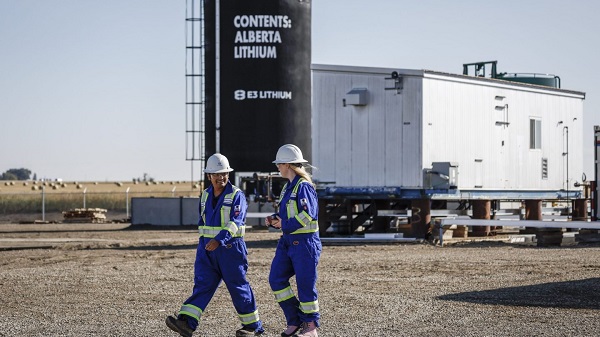
 Alberta2 days ago
Alberta2 days agoAlberta’s E3 Lithium delivers first battery-grade lithium carbonate
-
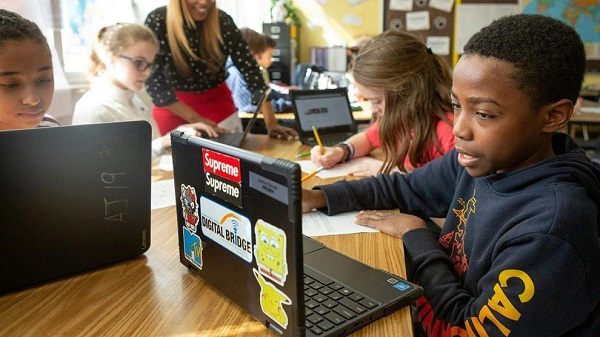
 Artificial Intelligence2 days ago
Artificial Intelligence2 days agoAI chatbots a child safety risk, parental groups report
-
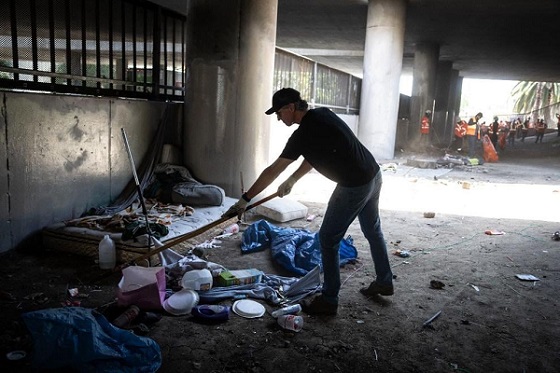
 Business2 days ago
Business2 days agoLA skyscrapers for homeless could cost federal taxpayers over $1 billion
-

 Energy2 days ago
Energy2 days agoNuclear power outperforms renewables every time
-

 Censorship Industrial Complex2 days ago
Censorship Industrial Complex2 days agoHurting someone’s feelings could be punishable under Canadian hate crime bill: legal expert
-

 Automotive2 days ago
Automotive2 days agoCanada’s EV subsidies are wracking up billions in losses for taxpayers, and not just in the auto industry
-
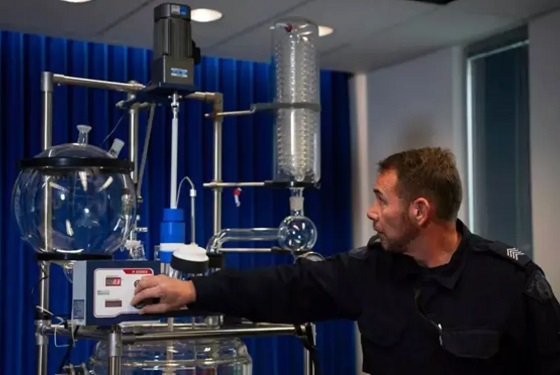
 Crime1 day ago
Crime1 day agoThe “Strong Borders Act,” Misses the Mark — Only Deep Legal Reforms Will Confront Canada’s Fentanyl Networks
-
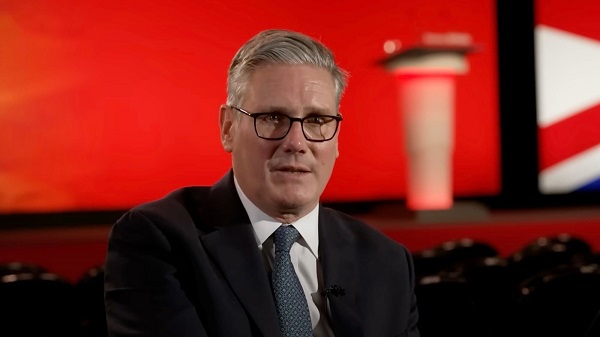
 Business1 day ago
Business1 day agoUK Government Dismisses Public Outcry, Pushes Ahead with Controversial Digital ID Plan






